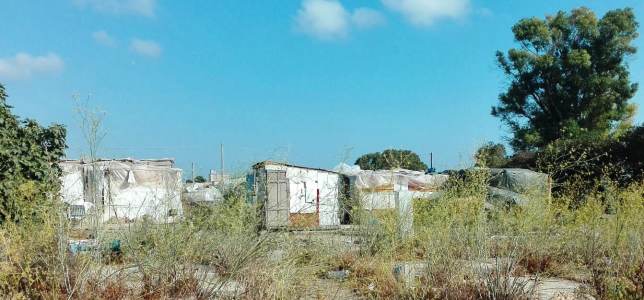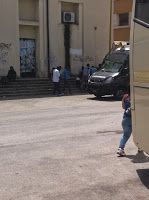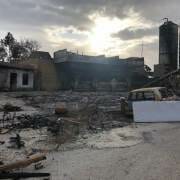Campobello di Mazara: Precarious Agricultural Labour and Discrimination
Campobello di Mazara is one of the most important stops in the cycle of seasonal labour in Sicily. Between September and December each year around 1,300 farm workers come to the area in order to work in the olive harvest, the majority of them originally from Subsaharian Africa. The situation is complicated. Although workers have been camping out in one of the nearby fields – “Erbe Bianche”, ‘White Grass’ – for many years, since 2014 a further space has been added, surrounding the former olive processing plant, confiscated from the Mafia.

The camp at Erbe Bianche, Campobello di Mazara (Province of Trapani)
This new area was made available for the workers to set up their tents following the explosion of a gas cannister at the tent site around Erbe Bianche, which took the life of Ousmane, a young Sengalese worker. Both at Erbe Bianche and at the old olive plant (named “Ciao Ousmane”), the daily living conditions are extremely unstable. The ‘Ciao Ousmane’ camp, after a long struggle by a small group of local activists, has been provided with a sanitary system and basic medical assistance is provided. Nevertheless, each year a section of the workers is forced to camp out at Erbe Bianche, given the large number of people present.
Interaction between the residents of Campobello and the seasonal workers is minimal, despite the recurrence of the event every year for a decade and the advantage of their presence for the local economy. In fact, the workers’ presence not only guarantees the harvesting of the olives – which would otherwise lack the necessary labour – but the 1,300 extra people in the area makes an not insignificant contribution to the local shops. Campobello di Mazara is a small town, and even if the camp sites are outside the town limits, the annual arrival of the farmhands is obvious enough. Despite all of this, they always seem to remain confined to a parallel world.
How is a situation like this brought about? Everything begins with the problem that an existing law is never observed: that employers are obliged to provide lodging to their workers. Since the start, this has almost never happened. Every now and again, someone or other has attempted over the years to rent a room, but up till today no one has managed to. Empty houses are not in short supply in Campobello – the problem is that the owners, simply put, do not want to hire out rooms to Blacks, Thus the workers are forced to set up tents or build make-shift shacks, even those who have been in Italy for many years, speak Italian and even often have a family and a home elsewhere.
This year a third element has appeared: a centre for asylum seekers and refugees (SPRAR*) within the old olive processing plant. For this reason, the local council has confirmed that they will not be opening the “Ciao Ousmane” camp this year for the seasonal workers. The anti-Mafia association “Libera”, along with various activists, have mobilised to pressure the local institutions to find an alternative solution, given that within 2 weeks people will start arriving.
In order to encourage the farmers to provide lodging for the workers, a project has been piloted which allows for a tax-break of €4 per person per day. Ten agricultural companies out of 2,500 official ones have taken up the offer and signed the bilateral agreement. The proposal includes a registration system both for the companies and the migrants themselves. The local council, the “Civil Protection” groups and the fire service have evaluated various alternative sites, private and public, which have all for one reason or another been deemed unsuitable. Frequently there is no sanitary system, the capacity is too low or the building is in an excessive state of abandonment. In some cases the site belonged to a Mafia landlord. At this point they returned to reconsider using the former olive processing plant. An area equivalent to two thirds of the site is to be fenced off from the SPRAR centre, and made available for a maximum number of 300 people. This solution, however, is far from sufficient, given that more than 1,000 workers will turn up over the next few weeks, and up till today the situation is far from being able to offer an acceptable reception. To complete it all, a final bad joke is that it seems that the workers will be asked to pay €2 a day in order to access the former olive factory, monies which will go into the local council’s coffers.

Make-shift housing at the Erbe Bianche camp, Campobello di Mazara (Province of Trapani)
At Erbe Bianche too, the situation is different from last year. During our visit at the end of August, there was already a small shanty town there. Around 80 people had set up camp, and more were arriving every day. There are a few tents, and instead wooden shacks have been built, covered with plastic sheets. Despite its humility, Erbe Bianche seems like a small town. In one of the shacks, bearing the title “Pizzeria”, we met two young women from Nigeria, J and M. They have come from Castelvetrano to work as cooks in the shanty town. ‘J’ ran her eyes over the campsite, where the men were coming back from work and beginning to prepare their dinner, wash their clothes or form small groups, chatting in hushed voices. “This is life”, says J, and firmly put her apron on and turned back to work.
Campobello is a paradigmatic example of how rights are a luxury for the privileged few. Unfortunately it is not the only such place where, in 2017, people are divided into first and second class citizens: from Cuneo in Brescia, passing through Puglia, a mountain of violations and violence continues to be perpetrated against the new millennium’s slaves.
There is no electric light at Erbe Bianche, and darkness falls over everything quickly. There is no electricity, no toilets, and the only water source is a single tap. Some of the men cook on open flames or with gas canisters. Obviously we could not refuse the invitation to eat with the young men present, despite their extremely limited resources: sharing is a part of their culture, an aspect which perhaps we should learn from a little more. Despite their difficult situation, those present are capable of building a system which allows for different nationalities, religions and languages within a civilised and peaceful coexistence, and a well organised one. This is what made the society within the “Ciao Ousmane” camp special. The dynamics of communication, the sharing out of work, solidarity and a micro-economy that have developed among the workers over the years is something extraordinary, which could even be a resource to be valued, an example to be followed.
Verena Walther
Borderline Sicilia
*SPRAR = Protection System for Refugees and Asylum Seekers (Sistema di protezione per richiedenti asilo e rifugiati)
Project “OpenEurope” – Oxfam Italia, Diaconia Valdese, Borderline Sicilia Onlus
Translation by Richard Braude



